The oft-repeated story is that if you are in a plane and the oxygen masks drop, you always put on your own mask first. Once your mask is on, you are free to help others without endangering your own well-being. The point of the story is that we need to take care of ourselves first so we are free to help others. But what happens to gifted women struggling with motherhood and homeschooling to such a degree that they cannot get their figurative oxygen mask on?
What happens to gifted women when they become mothers and, especially, when they homeschool their children?
Being a Gifted Woman
Gifted/2e kids are complex individuals and it takes a tremendous amount of energy to understand them and meet their needs. Gifted children are intense and are often voracious learners with overexcitaiblities that vary depending on how they are wired. Twice-exceptional (2e) gifted children not only get the gifted part of the equation, they also have at least one learning difference (and often many more) which further complicates things.
One author describes parenting gifted kids this way:
Misperceptions about gifted children can add an unwelcome layer of complexity to this situation. Because the general public imagines gifted children to be simply “smart,” and not tremendously complex, multilayered, asynchronous, and intense little people, other adults may be less sympathetic to the plights that gifted parents experience — and may not see them as “plights,” at all. Despite a deeply human need to connect with others, sharing details about daily life with a gifted child can be fraught for their parents.
Well, all of this intensity, overexcitability, and complexity doesn’t just peter out when these kids become adults. These gifted girls grow up to be young women. These women get married and have children. The complexity that comes with being gifted/2e doesn’t disappear when a woman gets married and starts a family. It doesn’t stop because she now has a gifted/2e child (or two or three) who has her own set of needs.
No, the gifted woman simply goes from being a gifted woman with all that THAT entails to also being responsible for all the “stuff” that comes with parenting a gifted child. Throw in homeschooling on top of the parenting (because most schools are ill-equipped to deal with gifted/2e kids) and you have a recipe for some serious overload for the average gifted woman.
How do we know?
In Warning: Parenting a Gifted Child May Be Hazardous to Your (Mental) Health, Jill Williford Wurman discusses a study by Australian researcher Natalie Rimlinger.
So while there is a general and enthusiastic consensus that parenting is normally quite demanding and difficult, do parents of gifted children actually experience more anxiety in any scientifically significant way, or is that just a self-pitying misperception?
This question bothered Natalie Rimlinger, an Australian researcher with a degree in clinical psychology. Given that “parents of children with ADHD and developmental problems show higher levels of stress in comparison to parents of children suffering from HIV and asthma and [typical] children,”[i] it seemed possible that other significant departures from the “average” child were likely to create parental stress and anxiety, as well. Did giftedness in a child in fact actually cause stress to parents, as she suspected, rather than confirming the societal misperception that gifted children are “easier” to parent?
Rimlinger’s study is fascinating and, frankly, very encouraging for gifted women who find themselves struggling with navigating both parenting and homeschooling in their family while wondering if it’s all in their head.
An exhaustive search showed Rimlinger that studies on the psychological well-being of parents of gifted children were… nonexistent. She therefore embarked on doctoral research to evaluate whether or not parents of the gifted truly do have a quantifiable and significantly elevated level of stress compared to parents of “average” children.
Dr. Rimlinger’s conclusions were perhaps more striking than even she had anticipated. Using an instrument called the Depression and Anxiety Stress Scales[ii], Rimlinger profiled the parents of 265 parents of gifted children in the US and 117 parents of Australian gifted children, and her results were clear: while the parents were less stressed[iii]and depressed than she had expected, they were much more anxious than she had expected.[iv] And during her analysis, she realized that the DASS scoring profiles looked familiar.
Indeed, the Americans were strikingly similar to another group: parents of developmentally-delayed children.[v] The Australians “looked like” those parents, as well — and also very much like parents of clinically-referred children, meaning children whose psychological issues were pronounced enough that they were seeking professional help.
What Rimlinger found, then, is what you no doubt suspected: the effect of parenting a gifted child is indeed quantifiably (and significantly) similar to the impact felt by parents of children whose struggles are widely acknowledged to actually be struggles.
In other words, it’s not your imagination — these extraordinary children, unsurprisingly to those who know them, do not always feel like a “gift” in terms of ease of raising them. In fact, this effect may be partly due to the fact the there is a widespread societal misapprehension that advanced intellect in a child paves a smooth road for their progress through life: while it’s hard to feel supported in your efforts as a mother or father if your child’s needs are out of the ordinary, it’s all the more stressful if no one believes you.
When Caroline was only a few years old and before we fully understood how she was wired, we shared with a couple of church leaders who visited our home our struggles with parenting. The response? Laughing and telling us we should have several more children so we wouldn’t have time to worry about it.
Zero understanding, zero empathy, zero support.
Later, after we had gone through testing (and then went through it again), I tried to explain the challenges we faced to a few people in order to help them understand choices we were making that they clearly didn’t understand or support. The answer I received was, “Well, you wanted her.” And then they changed the subject.
Zero understanding, zero empathy, zero support.
I’ve learned the hard way to not discuss these topics with people unless I know in advance they have a gifted/2e child. The pain of being minimized and dismissed is worse than the pain of being alone in your journey.
The Very Real Dilemma of Gifted Women
Gifted women, like gifted children, are wired differently. They don’t have any control over it and they don’t know life any other way. They have an innate driveness that can turn to quiet desperation and eventually depression if it is not fed.
Gifted women cannot give when their tank is empty. And yet they often have no opportunity to fill their own tank (or put their own mask on) because of the needs of their child. They spend so much time and energy dealing with the intensity of their child, they do not get the opportunity to deal with the needs related to their own intensity.
It truly is not an overstatement to say that gifted women who do not have an outlet for their drivenness become seriously impaired. Unless you have experienced it, it can be hard to understand. But the wiring in a gifted woman is so strongly made in certain directions that it can create a true sense of desperation to find an outlet for it. To access information. To create. To do whatever it is her wiring actually demands of her.
The impairment that results often means that gifted women struggle to fully embrace and enjoy motherhood and homeschooling. It isn’t because they don’t want to. It’s because their own deep needs go unmet so frequently that they aren’t able to do so. They repeatedly put the oxygen mask on their child first because they feel there is no other option. When there simply isn’t time for both, the gifted mom will put on her child’s oxygen mask first and take her own chances.
For women who are fortunate enough to understand their giftedness, it often has come at the end of a long struggle. Light bulbs have gone on and the various pieces of their life start to come together to create a more cohesive picture. But once they have that self-knowledge and then find it impossible to act on it, it’s a recipe for massive amounts of stress and frustration. It isn’t something they can turn off and on. It’s something they can only figure out ways to cope with.
But coping can only last so long before burnout starts to move in. No gifted woman can live in the area of constantly giving and dealing with the stress of an intense child without beginning to break down herself. As we see in the study above, the anxiety is real.
The Overwhelming Emotions of Gifted Women
One thing I have (anecdotally) noticed over the past few years is that there seems to be a much higher level of just-under-the-surface anger among moms who homeschool gifted/2e kids. Online discussions go south much more quickly, people are very quickly offended, and there seems to be much less empathy when you get a larger group of these moms together. I think much of this is due to the significant stress and pressure on these moms. Many of them live with incredibly intense kids and rarely get a break. Homeschooling a gifted/2e child can be incredibly lonely. I know how much my own situation wears on me and I readily admit mine is mild compared to what many moms of gifted/2e kids deal with on a daily basis. The compounding of their own unmet needs along with the anxiety of parenting and homeschooling gifted/2e kids can build up significant amounts of anger that can break through very quickly.
These are very real struggles in the homeschool community. I think they are needs that are invisible because most gifted homeschool moms aren’t going to voice what they are dealing with within the broader homeschool group. It’s bad enough to label your child as gifted and be judged for having the audacity to believe your child is different. To be a gifted woman and express concern or distress about how it is impacting your own overall well-being is a place most gifted women don’t want to go. It’s too painful to be misunderstood by the other homeschool moms around them.
I think this can be even worse if you are a gifted mother in Christian circles. The Biblical concept of dying to self is real and true. But what does that mean for the gifted woman who becomes a mother of a gifted child? How does she balance her own very real emotional and mental health needs with the needs of her child? It’s not like you can say in your small group or Sunday School class, “I’m a gifted woman with a gifted child and I feel like I’m drowning and losing my mind.” I just laughed while I typed that because the idea of saying that in a church setting is honestly so ludicrous. And that’s really sad.
I don’t know what the answer is. I really don’t. My heart goes out to all these gifted women who struggle every day. It is a hard and lonely road to walk. I don’t have three suggestions to give to fix it and make it better. It’s not that simple and I’m not going to insult gifted women by doing so.
Reading about that study did help. It made me realize that the struggles I deal with are real and not my imagination. It helped me understand other gifted women better and inspired me to work harder to embrace a more compassionate frame of reference with them when they lash out in anger toward me or other people due to their own pain.
And if there is anything we all need, it is more understanding and compassion.
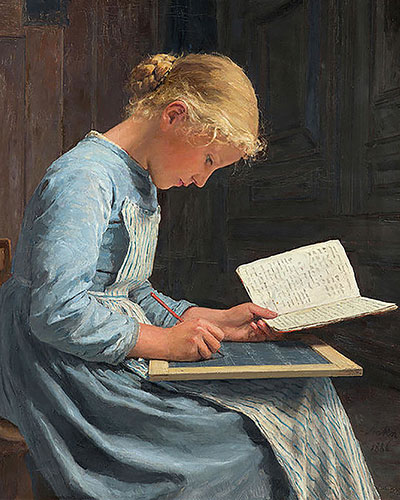

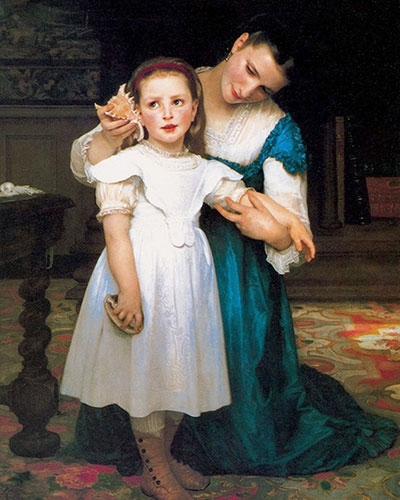

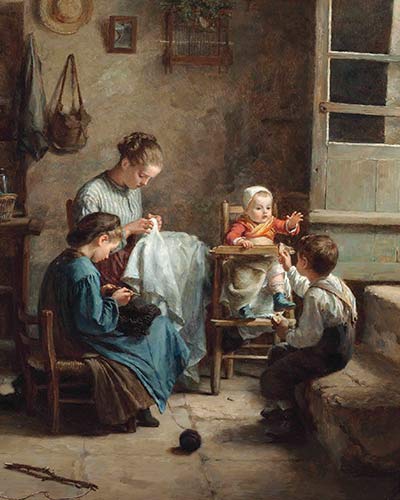


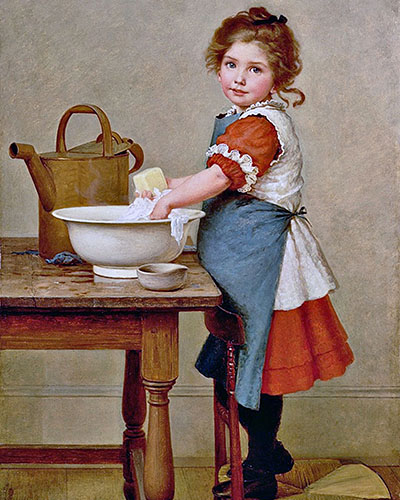


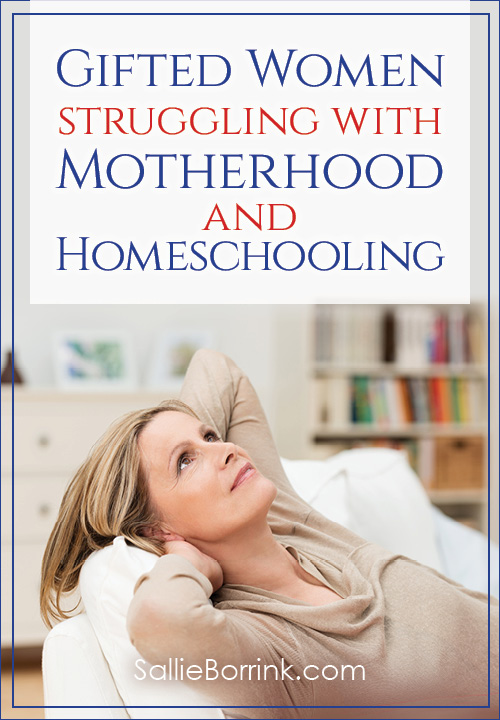




 Free Printable Christmas Gift Tags
Free Printable Christmas Gift Tags
Thank you so much for writing this! It has been a constant struggle to find contentment in motherhood and homeschooling. I have 5 children, and I am a military spouse. There are far and few opportunities for me to seek out my gifts in a fulfilling manner. Thank you again!
Hi Ashley,
I’m so glad this post encouraged you. You do have a full life with military life as well. Thank you for your family’s service to our country. ♥
I hope you are able to find even small moments and opportunities that meet your needs.
Sallie
Thank you, Sallie. I’m in tears. Sometimes knowing it’s not my imagination and I’m not alone is all I need to keep plugging along. You’re a blessing to our community.
Okay, now I”m in tears. Thank you, Lara, for your comment. ♥
Sallie
I’ve never heard this addressed before! Lots to think about here. (Add in gifted/2e fathers, and it becomes even more interesting.)
Yes! Parenting as two gifted parents with four gifted children can be very intense!
Hi Julianne,
It sounds like you have a home and family life with lots of intensity. That’s a lot of different needs and situations to juggle. I hope you are able to find peace and joy in the midst of all of it. (And I mean that sincerely, not in a patronizing way.)
Sallie
Hi Mama Squirrel!
It’s good to see you! Yes, adding a gifted/2e father to the mix will add another level to the situation for the mom/wife.
I’ve been thinking about a lot of topics like this. It takes time for them to all come together in my head, but then something clicks. Finding that post explaining the Australian study while poking around online was really helpful in bringing it all together for me.
Sallie
This is my first comment I think on your blog. I think I began following your blog somehow through Karen Campbell?
Anyway, your article came through “just in time”. I needed to read this so badly as I am feeling like I am “imagining things” a lot. My husband might be considered gifted/2e as well as ADHD which adds a lot to my stress and anxiety.
I used to homeschool, but I don’t now because it just got to be too much for me to handle.
My children are 16, 14, and 12. One of them has ADHD. We found a Classical charter school and my kids are thriving in that environment. Now, we are going to have to move, due to a job change, and I am very anxiety-ridden about the future because I don’t know what to do about schooling for my kids. I just couldn’t handle everything on my own.
My husband doesn’t understand why I am under so much stress. He downplays it and minimizes it, making me feel like I am crazy.
I admit that the stress drives me to have my own meltdowns, (makes me wonder about myself in the “gifted” area.) which I am not proud of. But it’s like you say, I don’t have the time or resources to put on my own oxygen mask.
Anyway, I identify a lot with what you wrote, even if it all doesn’t apply to me. I needed the validation that it’s not all in my head; today especially.
Hi Heather,
I’m so glad we connected. Karen is one of my favorite people and one of the people I truly miss seeing since I left Facebook. She was so helpful in getting me to look at parenting differently and really focus on the individual child and the relationship.
(For anyone who doesn’t know who we are talking about, Karen has a blog called thatmom.com which she doesn’t use as much now since she’s more on Facebook. But she had a tremendous impact on my parenting of Caroline.)
I think one of the worst feelings is feeling misunderstood by those who you want and need to understand you. I don’t care if random people in the world don’t understand me, but when people in my own circle of influence don’t understand me or choose not to try, it can be incredibly hurtful.
I hope you are able to find another school for your children where they will thrive. If we had a school situation where Caroline would thrive, I would have no issue with sending her. Watching the struggles of other moms with their gifted/2e kids has made me much more of a pragmatist when it comes to schooling these kids. Between my needs, her needs, and her being an only child, I would be more than willing to give her the opportunity to go to the right school. But there is nothing around here that would remotely meet her needs. Schools in other cities I have seen that specialize in working with 2e kids are generally $25-35k a year. I supposed we could swing that if we lived in our car, gave up our health insurance, and lived on ramen noodles from a hot plate that plugs into the cigarette lighter. LOL!
Over the past six to eight months I’ve been spending a lot of time thinking about the negatives and challenges of homeschooling that no one talks about but are very real. There are several more I’ve started posts about. I’m waiting for the right time to finish them up and publish them.
So, no, it isn’t in your head. The anxiety is real and so many of us feel it. I hope you feel less alone now. Feel free to leave a comment any time. There are a lot of great women who read and comment here who I think could also encourage you. ♥
Sallie
Thank you, Sallie!
I look forward to your posts about the challenges of homeschooling. Even though I am not homeschooling at the moment, my heart is for those who are doing it. I may need to go back to it soon once we move.
God has been so faithful in meeting every one of my needs and my kids. But it is still exhausting and lonely. It’s good to know there are others out there feeling the same things. Just knowing that, is a big relief and helps the burden seem a little lighter.
It’s a miracle that I found a good fit for a school for my kids. It’s a charter school, so it’s free. And the curriculum is Classical which they all seem to enjoy.
It’s not perfect by any means and there have been some challenges, but we have been able to move forward with those challenges. While it felt like we were constantly stuck in our homeschooling challenges.
I am so sorry people have not been more supportive when you tried to express that you have a hard time raising your exceptional child. I am shocked at the callousness/poor social skills, and glad you have this outlet to get some support (And give it!).
You are right that your sentence about being a “Gifted mom” with a “gifted child” would not go over well in a Sunday school (or really, any setting!). I know I don’t know much about this AT ALL, but does it help to express frustrations in terms others can relate to? Where you express what is problematic? For instance, instead of using the term “gifted” you might say “choosy” “intense” “hypersensitive” (or whatever term expresses what you feel at the time, please forgive me for putting words in your mouth.) The average person thinks of (and uses) “gifted” with only positive connotations. Not the official way, with all it’s implications, that educators know.
I think I may have a gifted, exceptional child–she’s highly creative and has the vocabulary of a child twice her age, but she has a lot of emotional meltdowns and gets frustrated very easily when something doesn’t come as fast as she expects. In fact, her emotional sensitivity is one reason why I want to homeschool her; I was mocked mercilessly in school for crying so easily at bullying, and still struggle some with feeling like I will be rejected by my peers.
Hi Suzanne,
Thank you for your thoughtful comment. You daughter does sound like she is in the possible gifted or highly sensitive (or both) camp. It is a blessing for her she has a mom who recognizes her needs and cares.
I think it takes two things for people to understand giftedness. First, a willingness to be educated. Two, time. In most relationships (such as at church) there isn’t enough time for people to understand it.
David and I were talking the other morning about this. He said before he became a parent to a gifted/2e child he would have automatically assumed that gifted meant smart, highly motivated, and easy to raise. While a small percentage of gifted kids will fit that description, the vast majority won’t. It takes a lot of educating yourself to understand. Most people can’t be bothered unless they have some serious skin in the game (like a gifted/2e child).
Keep us posted with what develops with your creative girl. 🙂
Sallie
Hi, Sally,
Yes, I’m sure quick conversations in a traditional church setting (where relationships don’t necessarily go deep), don’t allow enough time to help others understand (and as you said, sometimes they don’t *want* to take time).
After I posted, I read some more about the challenges Caroline faces, and that you face trying to take her to church. My sympathies go out to you. Our challenges with our child are much less intense. (We do have other, very difficult circumstances right now, involving a health challenge and job loss. It’s the sort of thing that often makes me feel misunderstood or judged, especially if people won’t listen to the full story.)
Anyway, thanks for helping me understand more about 2e kids and their parents struggles.
On the church note, the idea of “house church” came to mind. It likely wouldn’t meet your expectation of a church service (they feel more like a Bible study) but it would be a quieter setting and one that probably wouldn’t be as difficult. In my state, there are some here and there, but I know you are in more remote area. …just a thought.
Warmly, Suzanne
I’m not a mom of a gifted child, I am the grandmother raising the gifted grandchild. This post put into words exactly how I feel. I actually told my husband I feel like I’m trapped in a world of no sleep, no productivity, no relief. My child is 24/7 on the go. Curious about everything and anything. There is no time to just breath! I feel myself getting frustrated, even angry for no apparent reason. I pray continually, which helps. I try things I read about that could help, so far I haven’t found what I call the key to peace and joy. I know it is there somewhere and I won’t stop looking for it. In the meantime, I crave a hot bubble bath!
Hi Sherri,
I’m glad the post resonated with you. Thank you for taking the time to leave a comment.
One of the things that surprised me about parenting is how much it wore on me emotionally and brought out frustration and anger that was not normal for me. Teaching a classroom of first graders was exhausting physically and mentally by the end of the day. But parenting just ONE gifted/2e child exhausted me emotionally in ways I never could have expected.
I don’t know how old your grandchild is but we’re enjoying one perk of the tween growth spurt. Caroline will sleep in until 10 or 11 every morning if we let her. (She’s also up at night until 11, 12, 1 or even later, but we’ll ignore that part.)
I get up by 7:15, eat breakfast, and go right to my computer. If I settle right in, I can get a couple of hours of quiet work done before she wakes up or I have to get her up. Then I shower and get dressed while she’s having her breakfast. It’s not how I would normally choose to order my day, but it does give me some quiet moments in the morning now to think and work and I’m grateful for that as long as it lasts.
Adapt and advance has become our motto around here over the years. LOL!
I hope you can get one of those bubble baths sometime soon!
Sallie
Hi Sallie
My grandson is 11. I agree this is very emotionally exhausting. The constant questions about everything that pops into his head. I question myself because I don’t want to squelch curiosity and learning, yet at the same time I crave silence.
I also agree the one place I always believed to be a place of love, compassion, help, and support (church) just isn’t there for us. That broke my heart. As a christian I truly believe we are to help in whatever capacity God gave us to help.
I truly believe these children are the way they are for a particular reason/purpose. I won’t pretend to know what that is, nor will I fool myself to believe I will know sometime in the future, because I may never know other than God has a plan and that is all I need to know.
I believe God only gives us what He equipped us to handle. There are days tho that I feel I am clinging to the cliffs edge by my toenails and I have just trimmed them super short, not much to hang on with.
Keep up the writing this is such a blessing for me as I’m sure it is for others also.
I need this so much today I can’t even begin to explain! Thank you so much.
Hi Vanessa!
I’m so glad this helped. No explanation necessary. ♥
Sallie
Great work here, and a start to filling a real need. I do hope you’ll write more and more about it. Some of us gifted gals have 2e kids and a 2e spouse! The need for any and all support is real.
I don’t think we should gloss over how the church is not sensitive to women in this situation. One of our pastors is aware and supportive; it took me 10 years to find her! But I believe change in the church starts with me. Working in kids ministry once or twice a month helps me identify the gifted kids and then I can reach out to the moms. A wise friend said serving kids is service to moms; I just add a little secret gifted bonus!
Anyway… you’re terrific, Sallie. This was timely.
Hi Cristy,
Thanks for your kind words. I am determined more than ever that moms who are gifted/2e and/or have gifted/2e kids will know they are not alone.
I think this is especially true for Christian moms in this situation. Ginny at Not So Formulaic writes about gifted/2e from a Catholic perspective and I write about it from a Protestant perspective. To my (albeit limited) knowledge, I’m not aware of other bloggers/writers writing clearly about both faith and gifted/2e. There is plenty to write about gifted/2e that includes all people whether they practice a specific faith or not. But for people of faith, there is another dimension to it that I almost never see addressed.
Your strategy at church is a good one. I’ve thought about trying to reach out to the moms at our co-op with gifted/2e kids, but it’s hard to figure out how to make that kind of announcement without coming off really badly. LOL! Something to think and pray about for the future if God wants to open up those doors.
Sallie
I know of no one else taking a faith perspective publicly. I’m so glad you are doing it. There certainly IS an “elephant in the room” in Christian circles regarding giftedness, and an emphasis on “appropriate” behavior in church, which is grossly unfair to children who are 2e. I left a children’s ministry when a director said they hoped that the family with exceptionalities wouldn’t be back for the Christmas pageant.
RE: reach out in church, I simply start with, “Your child is obviously very bright.” This usually surprises most parents, because in my kid min classes, the bright ones are usually VERY different from the other children LOL. From there, I can ask them about how they excel, and then work from there. Most are surprised that I would know their families have giftedness/2e. Meeting my daughter often helps.
Thank you.
You’re welcome, Kelley. ♥
Sallie
This part pretty much sums up my first ten years of motherhood: “But the wiring in a gifted woman is so strongly made in certain directions that it can create a true sense of desperation to find an outlet for it. To access information. To create. To do whatever it is her wiring actually demands of her.”
In retrospect, I can see how I flung my energy in so many different directions (book clubs! children’s ministries! complicated cleaning schedules!) simply to keep my mind as occupied as possible during my kids’ early years. Not to say that any of these things are bad, but that I was doing too many things (and not the things that really nourish me) in a vain attempt to just have some mental exercise.
Sallie, thanks so much for this article.
Hi Kate,
This line stood out to me:
“and not the things that really nourish me”
This is so true! I think many of us know that something is wrong and we try to find something that will work. Oftentimes we try things that fit with our new situation as a mom (children’s ministry) or homemaker (cleaning schedules) because we are trying to fit ourselves into who we need to be now due to life situations. But they aren’t the things that nourish us and so they simply add to our frustrations and desperation. They suck more life out of us rather than giving us what we need.
Thanks for that good thought! I’m going to reflect some more on that!
Sallie
A thousand times thank you! It is so helpful to know that I’m not the only one receiving dismissive and hurtful comments from others, as awful as that sounds. I’m a single mom (by choice— so I also hear a lot of the “but you wanted her”). Most of my struggles are dismissed by others as simply a “single mom” issue. I have an incredible support system, so the single mom parts for me seem mostly logistical. It’s the gifted/2e part that is exhausting. I fortunately have a mom who went through the same thing with me and my 2 younger brothers— now retired, she was an elementary ed teacher who was “blindsided” by a kid like me. She fortunately had an ally in a school psychologist and helped start a G/T parent support network in the 1970’s! (Pre-internet… my mom is quite talented too. ?). All 3 of us kids were very different which challenged her in a positive but exhausting way.
I’m trying to find a school that will better fit my 4y.o. daughter’s needs. In an unrelated conversation, the director of her current school said, “she’s smart and it’s obvious you work with her at home.” HA! Big fat HA! We do no school-related academics at home. Mornings are trying to find clothes that aren’t too scratchy/poofy/soft/tight/loose, car rides are answering millions of questions about what construction materials were used for this and that or do all cultures bury their dead (and if I die before she’s a grown up, who will she live with) or how close is xyz animal from becoming extinct. Evenings are mass quantities of food, more questions, and the fight to get her into bed. She creatively uses routines against me and catches on to my new strategies within a few days. We aren’t sitting at home working on writing letters correctly, phonics, arithmetic, etc.. I am just trying to survive.
The lack of understanding recently cost me a relationship with a gifted/2+e single dad. His gifted sons are teens and in magnet schools with gifted programs. I don’t think he remembers the struggles of the early years when he was married and his in-laws were living with them. He broke up with me because he saw our differences in “parenting styles” causing too much conflict down the road. He viewed my exhaustion and struggles with my daughter as evidence that I hadn’t extablished authority and effective routines. And that I was being “that mom” about her schooling. He felt my daughter needed to learn how to adapt in mixed-ability classes, and could wait until 3rd grade for gifted programs, like his sons did. I thought of all people that he would understand, but of course all gifted kids are different. The same strategies won’t work for each one— that adds to the delight and exhaustion.
Hi E’s mama,
I’m so glad you found this post encouraging. We DO need to know we aren’t alone, especially when it comes to those dismissive and hurtful comments.
It’s interesting that you brought up the “single mom” issue as a way for people to dismiss your concerns. We faced that but from the perspective of being only parents of a long-waited for only child. It’s like people are looking for ways to dismiss our legitimate needs and so they pick some kind of stereotype they can latch on to and blame our struggles on that.
Oh, the endless questions AND the clothing issues. She definitely sounds like a gifted/2e child. LOL! Life is about trying to anticipate two or three steps ahead of these kids, just like you mentioned with her analyzing your routines and so on. Doesn’t it just boggle the mind how sophisticated your four year old is in her thinking abilities? I mean, there are adults who can’t do what your daughter is doing. I know it makes life harder for you, but when you look at it objectively it’s truly fascinating how these kids are wired.
I’m sorry that all of this caused problems in your relationship. That’s really sad. I think most parents with gifted/2e kids don’t want to be “that parent” but we end up being “that parent” because we realize we have no choice. Our child’s well-being depends on us going to bat and doing what she/he needs, even at our own expense.
I’m glad you have support from an understanding and experienced mom. That’s a huge win for you and your daughter that many gifted parents don’t have so it’s a real blessing.
Thank you for taking the time to share part of your story with us. I know it will help other moms and dads who find this post in the months and years ahead.
Sallie
I’m new here, as a link to your post here popped up on my Facebook feed. Thank you so much for addressing a topic I NEVER thought anyone would tackle. Your insights are, in my opinion, spot on and I am feeling validated in this for the first time…possibly ever LOL! If you ever decide to form a Facebook group or other community around this issue, count me in. I’m going to go follow your blog now.
Hi Julia,
I’m so glad you found your way here. Welcome!
This website truly is my community. I was on Facebook and had a page and a small group at one time, but left Facebook last spring so I could focus on writing here and really connecting with the (primarily) women who read here. Leaving Facebook was important for my mental health. LOL! It was also important for me professionally. I wrote a couple of posts about it if you are interested in reading why. (I don’t expect everyone else to leave Facebook. These are just me thinking out loud and sharing my decision.)
Why Can’t You Quit Facebook Permanently and Delete It All?
I Quit Facebook – My First 30 Days
I look forward to hopefully getting to know you in the days ahead. Feel free to join the discussions in post comments.
Sallie
Sallie!!! Thank you for this post!! I’m so sorry that you have had such a struggle. I can completely relate and empathize. Everything you write about yourself and your daughter resonates with me. I am 100% at burnout right now. Your words mean more than you know.
Hi Molly,
I’m so glad this post was meaningful. After I saw your comment come through, I started reading through all the other comments that women had previously left. There are so many of us struggling through on this particular path and it’s helpful to know we aren’t alone.
Hugs,
Sallie
This article was just what I needed right now. I definitely feel alone and misunderstood and even unsupported at times in our homeschooling journey and family dynamic.
I know God is faithful, and He has a plan for my family. But the stress of it all is getting to be too much for me.
Thank you for putting this out there. It is comforting to read and know it’s not just me. <3
Hi Brittany,
Thank you so much for letting me know this post was encouraging. No, you aren’t alone and it isn’t just you. There are many of us out there. I personally found it so helpful to read that research. It’s one thing to see it around you in others and see it in your own life. It’s another thing to have people try to study it objectively and come to the same conclusions.
Sallie